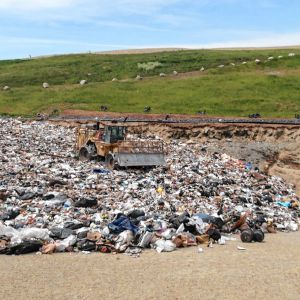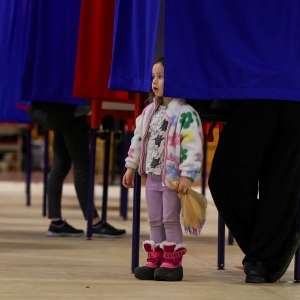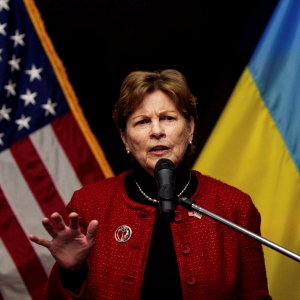‘Being closer to New Hampshire is better’: Sununu signs child welfare reforms, prioritizing in-state residential care

New Hampshire State House ALI OSHINSKIE/NHPR file
|
Published: 08-26-2024 3:40 PM
Modified: 08-26-2024 4:25 PM |
Cassandra Sanchez’s visit to a Tennessee facility last year raised an alarm for the New Hampshire child advocate.
One of the children held at the facility told her he had one goal: to do “whatever it takes” to return to the Granite State.
A new law, signed by Gov. Chris Sununu Friday, will help with that goal. Senate Bill 417 will reduce out-of-state placements for youth in the state’s care and reinforced protections for kids who are unable to be placed in a New Hampshire facility.
Sanchez’s visit to the Bledsoe Youth Academy in Tennessee helped spurred this policy change, she said.
“Our state was utilizing facilities that we truly didn’t know enough about. We didn’t fully understand the program that was being offered to the children and we didn’t understand the conditions in which they were living,” she said. “We found the conditions, which were extremely concerning and unsafe and re-traumatizing to our children. That’s when we really took a focus to we need to do more.”
The Bledsoe facility in Tennessee, which has 30 beds for boys ages 12 to 18, was designated as a therapeutic placement. A report from Sanchez’s office indicated that the facility did not meet the needs of the state since it was positioned more as a punitive detention center. Other states, including Vermont, have also raised concerns about the facility.
“We’re seeing children with really high needs as the ones that are being sent further away with very, very unique types of needs,” said Sanchez. “So that also does point out some gaps here. Do we have the programs that can truly meet the needs of our children?”
The new law – sponsored by Sen. Becky Whitley, a Hopkinton Democrat – gives preference to in-state placements and only allows out-of-state options when New Hampshire facilities are unable to provide the services the child needs.
Article continues after...
Yesterday's Most Read Articles
 ‘There was no oversight’: NH child advocate has been a watchdog for children's care. Now, the office is on the chopping block
‘There was no oversight’: NH child advocate has been a watchdog for children's care. Now, the office is on the chopping block
 Volunteer group wants to help homeless clean up their camp
Volunteer group wants to help homeless clean up their camp
 ‘Less finger pointing, more communication’: Longtime Chichester residents share hopes before second town meeting
‘Less finger pointing, more communication’: Longtime Chichester residents share hopes before second town meeting
 Casella Waste Systems’ landfill project in New Hampshire’s North Country denied permit
Casella Waste Systems’ landfill project in New Hampshire’s North Country denied permit
 New Healthy Buffalo owner to build market in Chichester
New Healthy Buffalo owner to build market in Chichester
 ‘It’s everything’: In largest rally yet, Trump protestors descend on Concord
‘It’s everything’: In largest rally yet, Trump protestors descend on Concord
Out-of-state placements differ from the state’s youth detention center. Often, kids are sent out of state when they require a specialty program, like children with “problematic sexualized behaviors” or who have a history of aggressive behavior in prior placements or foster care, said Sanchez.
“Those children are almost always turned away from programs in state because they don’t have the adequate treatment for them,” she said. “Our program couldn’t meet their needs. They have to go elsewhere. And that means, because they don't have a program in state, that means they have to go out of state.”
The number of children who are in out-of-state facilities varies, with 30 children placed nationally at a peak, and other reports of three children. This spring, the Office of the Child Advocate received a report of nine children out of state.
A report from the Office of the Child Advocate regarding the Bledsoe visit indicated that as of July 1, 2023, 306 children were in residential placements in New Hampshire, with 69 kids out of state.
The state’s specific data collection is also sparse. Sanchez said she is able to look at the length of stay averages for all children – which includes foster care placements and in-state residential programs – but isolated data for children outside of New Hampshire is harder to parse out. Right now, individual cases have a child’s length of stay, or a facility may call asking for the state to look into a specific case if a child has been there for five or more years.
Improving this data collection – to be able to see the average length of stays out of state – and further analysis from these records is one of many items on Sanchez’s list of future reforms.
The out-of-state facilities must be contracted with the state and preference is given to placements in close proximity to family. The law also strengthens oversight of children’s cases and outlines specific guidelines for reunification.
When deciding whether a parent is fit to care for their children, the bill lays out parameters for the court to consider, including the medical needs of the child, the existing relationship of the family, their parents’ mental health and substance use, care for other children in the house, the condition of the home and any prior allegations of abuse and neglect.
If a child is unable to be placed in an in-state residential facility, foster care or with other family members – and out-of-state services are recommended – the law says it should be “for a limited time and with frequent review.”
The goal of these placements is to “return the child home or to a family setting in the community of origin as quickly as possible.”
Reiterating this as the priority – bringing kids back into care within the state – is essential, said Sanchez.
“Being closer to New Hampshire is better for their long-term outcomes,” she said. “If we’re looking at particularly children who may be able to reunify they need to be close to be able to do that therapy, to incorporate their caregivers and spend time with them to prepare for that return home.”
To send a child to an out-of-state facility, the court must provide a written explanation showing that no options exist in-state to meet the child’s needs. The director of the Divisions for Children, Youth and Families must sign off on the placement, as well.
The report did not indicate why New Hampshire youth were placed there or what services were available at Bledsoe that could not be provided at in-state facilities.
“We need to really dig into how well our system is doing,” she said. “Anecdotally we can say we know it's a problem but do we actually have the data analysis happening currently? Not that we need. That’s really, really important.”







 Town elections offer preview of citizenship voting rules being considered nationwide
Town elections offer preview of citizenship voting rules being considered nationwide Medical aid in dying, education funding, transgender issues: What to look for in the State House this week
Medical aid in dying, education funding, transgender issues: What to look for in the State House this week On the Trail: Shaheen’s retirement sparks a competitive NH Senate race
On the Trail: Shaheen’s retirement sparks a competitive NH Senate race ‘If it affects one, it’s going to affect all’: Dozens protest federal firings in Concord
‘If it affects one, it’s going to affect all’: Dozens protest federal firings in Concord
